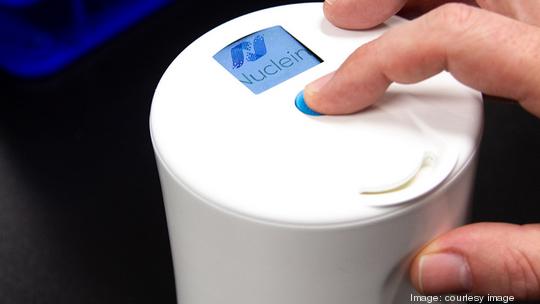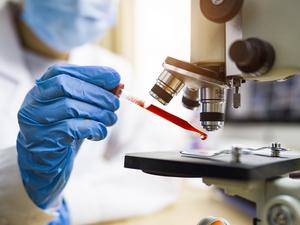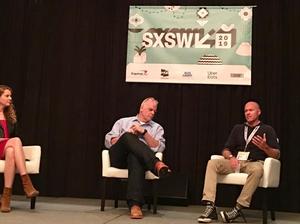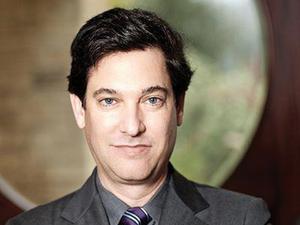
Austin startup Nuclein might become known as the company that made an at-home Covid-19 test that's so easy you just spit in a can, press a button and wait about an hour for results.
But this isn't the story of a startup built out of the current pandemic. Nuclein was founded back in 2017, when the big threat on our disease radar was the Zika virus carried by some mosquitos.
The idea for building an at-home diagnostic device came to co-founder and CEO Alan Blake when he and his wife were thinking about having a baby. At the time, mosquitoes were abundant in their backyard, and each bite had the potential to become a long-term health problem.
"The big challenge at the time was that it wasn't really clear how much of a concern Zika was," he said. "And we're getting sort of mixed messages on that. So the idea of having a way to quickly, easily, inexpensively test for it was something that was on my mind."
Blake turned to his long-time friend Dr. Richard Crockett, who he has worked with for more than 20 years. The duo met in sixth grade when they both lived in Yorktown, New York. They went on to create an early edtech web startup while at the University of Texas in Austin, and later they teamed up again as founders of Yorktown Technologies LP, which created fluorescent fish brand GloFish and later sold its intellectual property for $50 million in cash.
For several years, the small Austin-based Nuclein team has been developing a soda can-sized canister capable of analyzing samples to detect diseases. They invested their own money and returned to the friends and colleagues who had invested in their prior businesses to raise about $2 million in initial funding.
At the time, there wasn't intense urgency to perfect the product and get federal approval. They completed their prototype around January 2020.
Then, Covid-19 came along.
The pandemic spurred the company to expand from two full-time employees to its current team of 30 and move from a 600-square-foot space at Austin Community College's Bioscience Incubator.
"We now have roughly 10,000 square feet of space, and we've outgrown that, and we're looking for a new space [in Central Austin]," Blake said. "So it's just dramatically different in terms of the growth rate of the company, in terms of the urgency of our work and in terms of the awareness with regard to the importance of diagnostics. And in particular, what we're working on, has the potential to really bring together the best of different types of testing that are currently available."
It also led the founders to leverage their long relationship with Southlake-based Trinity Private Equity Group, which is leading Nuclein's new $14 million series B funding round.
The firm joined a list of early Nuclein investors that includes William Cunningham, former president of the University of Texas at Austin; John Butler, former director of IC2; David Shockley, CEO of International Biophysics Corp.; Joe Aragona, co-founder and general partner of Austin Ventures; Jason Dorsey, president of the Center for Generational Kinetics; and Alan Richey, a senior vice president at Dell Technologies.
Nuclein, which has now raised about $20 million total, plans to use the new funds to expand its team, find a new office space and get its cornerstone testing device through the Food and Drug Administration approval process sometime later this year. It has current job openings for molecular biologists, engineers and manufacturing staff.
Taking on a private equity round is a bit nontraditional for a pre-revenue startup that doesn't yet have a product for sale. But Blake said it was the right move for Nuclein because Trinity offered more flexibility and was able to move faster than venture capital firms.
"I would encourage people to think a little bit more broadly about their business, and whether they're able to look at some nontraditional funding opportunities, because I think the landscape, the zone of opportunities for different types of funding mechanisms are becoming broader than they have in the past," he said.
How it works
Nuclein's disposable test device has a lot of science built into it. But, for consumers, it's pretty simple.
"As we like to say, 'spit, push button, get results,'" Blake said. "It doesn't require any technical expertise to operate, provides answers in under one hour and it does not require a mailed-in sample."
These days, people generally test for Covid-19 using rapid antigen tests — which can have more false negatives — or more sensitive polymerase chain reaction, or PCR, tests, which usually take longer because they require more attention in labs. Nuclein's device employs real-time PCR, essentially making it a miniaturized version of a lab. The company hasn't yet disclosed what the device might cost, but Blake said it will be competitive with current PCR testing.
The product still needs FDA emergency use authorization. Blake said he expects to clear that regulatory hurdle and begin offering its testing devices to consumers later this year.
Other startups have also pushed into Covid-19 testing, including Austin-based Everlywell, which sells at-home test kits that are shipped to labs for results within 24 to 48 hours.
Post-pandemic world
Starting March 29, everyone over age 16 in Texas will be eligible for a Covid-19 vaccine. It's a move that hints at a future where there won't be as much demand for Covid testing.
Nuclein embraces that future. But it probably wouldn't mean an end to testing.
"We think that there will be a significant need for Covid diagnostic testing for the foreseeable future," Blake said. "On that point, specifically, while we hope that everybody is able to get vaccinated, certainly a lot of people, it seems, are currently choosing not to get vaccinated. We also don't know how long the immunity will last from vaccines. We also see variants emerging from Covid. And so the expectation from public health experts for the foreseeable future is that we will continue to need diagnostic testing for Covid."
But even if we put an end to the pandemic, there are dozens of ongoing use cases for Nuclein's device, Blake said.
"PCR is an incredibly powerful technology," he said. "And whether we're testing for upper respiratory pathogens, or gastrointestinal pathogens or sexually transmitted infections, or any number of different infectious diseases in humans, or in animals, or genomics, or environmental, DNA, RNA, there are an enormous number of applications for rapidly usable, disposable, handheld PCR testing devices, and we expect that need will continue for many years to come."







